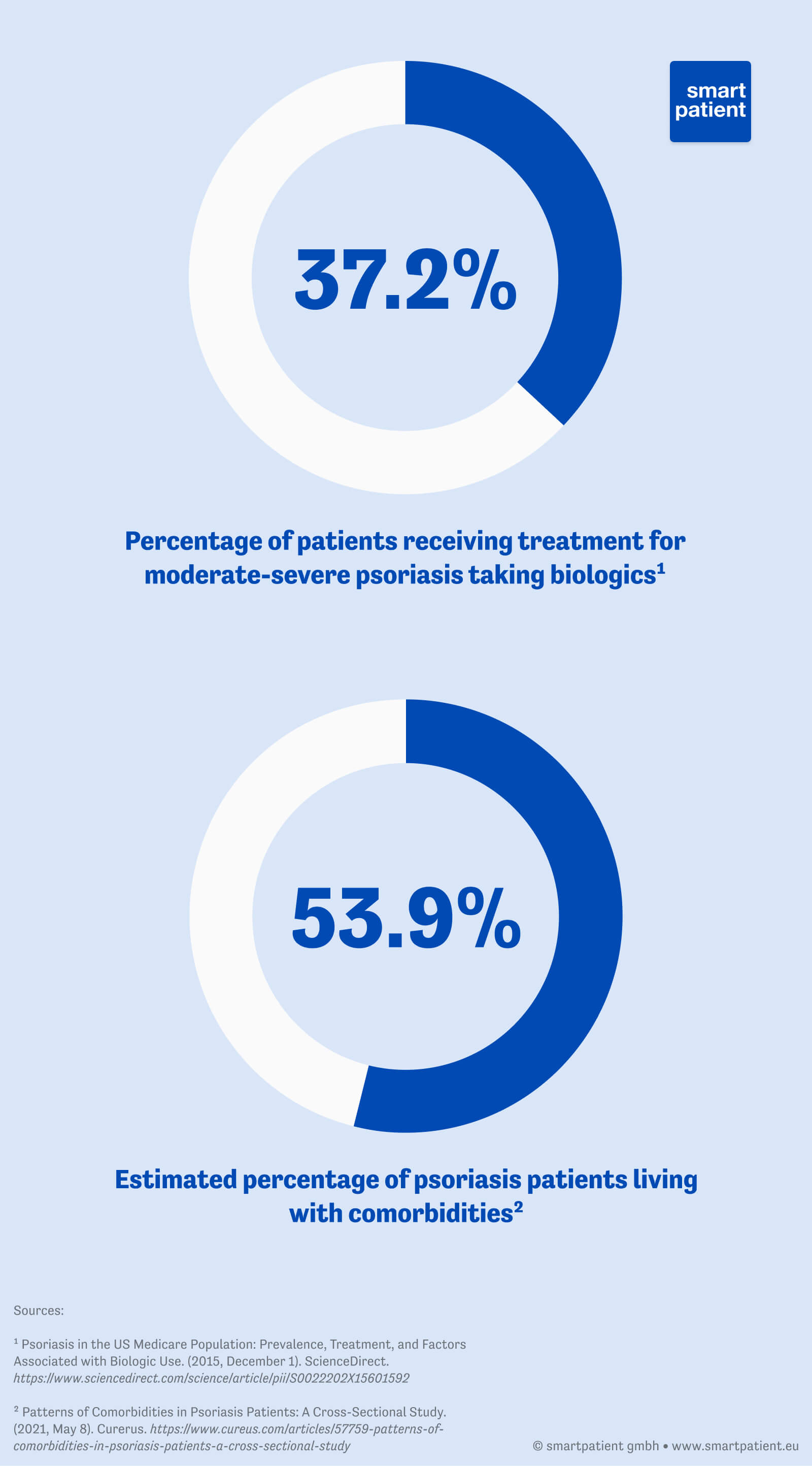Patient Support in Psoriasis: Pharma’s Hall of Shame?
Millions of people are living with psoriasis, many of whom have comorbidities. Some of them are cracking along, while others are struggling badly. Enough of a reason, for pharma to put the patient at the center? Not quite.

- Pharma’s patient support for psoriasis is typically narrow, focusing on just the disease or even a specific drug, failing to meet users’ wider needs
- Users are a diverse group of individuals with different day-to-day requirements, including those relating to an array of comorbidities
- MyTherapy for Psoriasis enables pharma to provide 3 layers of support – general health, psoriasis-specific, and drug-specific – in one package
Pharma’s patient support and education offerings have typically focused on a single disease or a specific drug. The same holds true of psoriasis, despite the high prevalence of comorbidities associated with the condition. We believe that the next generation of patient support programs must be able to meet users’ broader needs. Keep reading to find out more about the rationale and about strategies for making PSPs relevant in psoriasis and beyond.
Psoriasis Comorbidities: Not Just Psoriatic Arthritis
No two people living with psoriasis are alike. Some don’t require any treatment, others will use topical treatments, while some are on stronger medications, such as biologics. Furthermore, many live with comorbidities; while the obvious one is psoriatic arthritis, it is well established that psoriasis is associated with a host of other conditions. They include – but are not limited to – cardiovascular disease, metabolic syndrome, high blood pressure, and autoimmune diseases.

Considering the various forms of psoriasis, the different levels of severity, the range of treatments people take, and the prevalence and diversity of comorbidities, it becomes abundantly clear that each individual living with psoriasis faces different challenges. Why then, does pharma persist with digital support programs that are too rigid to be useful for such a needy and diverse user group?
Pharma’s PSP in Psoriasis: Product Support Programs Not Patient Support Programs
Pharma’s PSPs typically take a product-centric approach. The idea is that all patients who are prescribed a particular treatment will face the same daily challenges, all of which revolve around this one single medication. Of course, this couldn’t be further from the truth. In reality, a single medication is only a piece of the puzzle for many.
Furthermore, psoriasis is a diverse and changeable disease. From the severity of the condition to the possibility of being diagnosed with psoriatic arthritis, many people find themselves switching from one treatment to another in search of something effective. Typically, this starts with topicals and often leads to more potent treatments, such as biologics. This process can be both long and frustrating. The support programs pharma does provide, however, typically only cater to those on the more potent (and expensive) medications, thus neglecting the huge number of people who are yet to find an effective treatment.
Essentially, pharma’s digital support programs are product support programs rather than patient support programs and, even then, are limited to the products sat at the lucrative end of the scale.
Why in Psoriasis, Patient-Centricity Requires an Open Approach
Throughout the development of MyTherapy, we have seen users living with a range of chronic diseases adopting the app to manage the treatment – whether that is a single medication or a complex regimen. The same holds true for psoriasis; users taking everything from topical treatments to biologics use the app.
We attribute this to MyTherapy’s disease- and drug-agnostic approach: While the app works for any medication and treatment-related task and is thereby ideal for users' diverse set of needs, a highly personalized experience makes the app very easy and straight-forward in day-to-day use. Nonetheless, we recognize the need for additional functionality for people living with particular chronic diseases, including psoriasis.
That is why we believe a new ‘open program’ approach fills a support gap that exists for countless patients globally. By launching disease-specific extensions on top of MyTherapy’s core functionalities, we can deliver the best of both worlds. Furthermore, we can offer an even more tailored set of functionalities for our partners in pharma that can support people taking specific medications. Pharma can reach a wide range of patients and deliver more relevant support and education. This can help pharma achieve patient-centricity in its support offerings – a concept that has long been promised yet that remains elusive.
Following ‘MyTherapy for MS’, ‘MyTherapy for Psoriasis’ is the second disease extension we are launching upon MyTherapy. You can learn more about the program here. If you would like to speak to us about ‘MyTherapy for Psoriasis’ or how this approach can apply to other chronic diseases, don’t hesitate to get in touch.





